 Southern Paternalism and the American Welfare State
Southern Paternalism and the American Welfare State Published online by Cambridge University Press: 05 May 2010
Introduction
Because social insurance had great appeal across the nation, it was harder to fight than programs aimed narrowly at reform in agriculture and Southern agriculture in particular. But even after the threat to paternalism raised by the Social Security Act had been defeated, the federal government remained interested in pursuing policies like those of Federal Emergency Relief Administration (FERA) described at the start of Chapter 3 that addressed rural poverty specifically. Though the fight to exclude agriculture from social insurance programs had been won by the South in 1935, the federal government sharpened its focus on rural poverty in 1937. The Farm Security Administration (FSA) represented intervention in Southern labor relations to alter the relative economic power of landowners and laborers, and then to leave them free to contract among themselves.
The history of the FSA provides a clear example of the difficulty the Southern elite faced in preventing federal intervention in the South's system of labor relations, even as the region sought federal dollars. This episode also illustrates the lengths to which the elite would go to preserve the system of paternalistic relations between them and their dependent laborers and the economic benefits the elite derived as a result. The threat that the FSA posed to the South's system of paternalism was the FSA's role as an intermediary between landlords and tenants. But the FSA's exclusive focus on agriculture left it without a broad base of popular support when the Southern rural elite turned to face that threat.
To save this book to your Kindle, first ensure [email protected] is added to your Approved Personal Document E-mail List under your Personal Document Settings on the Manage Your Content and Devices page of your Amazon account. Then enter the ‘name’ part of your Kindle email address below. Find out more about saving to your Kindle.
Note you can select to save to either the @free.kindle.com or @kindle.com variations. ‘@free.kindle.com’ emails are free but can only be saved to your device when it is connected to wi-fi. ‘@kindle.com’ emails can be delivered even when you are not connected to wi-fi, but note that service fees apply.
Find out more about the Kindle Personal Document Service.
To save content items to your account, please confirm that you agree to abide by our usage policies. If this is the first time you use this feature, you will be asked to authorise Cambridge Core to connect with your account. Find out more about saving content to Dropbox.
To save content items to your account, please confirm that you agree to abide by our usage policies. If this is the first time you use this feature, you will be asked to authorise Cambridge Core to connect with your account. Find out more about saving content to Google Drive.